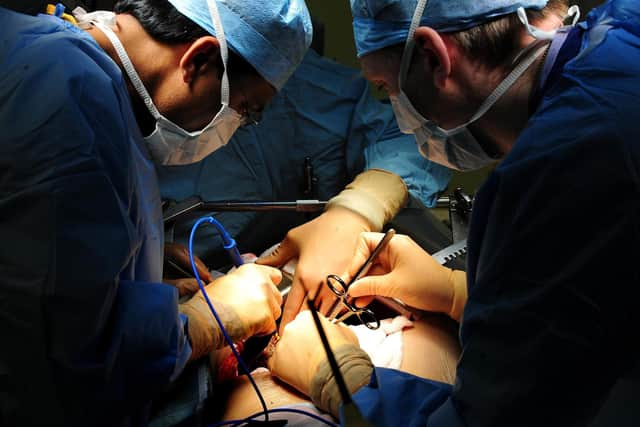Taboo-busting call on Wiganers to talk about bowel cancer - it could be a life-saver
and live on Freeview channel 276
The alert was sounded after latest figures reveal that around a third of people eligible for testing are passing up the chance of getting a reassuring negative result or a potentially life-saving early diagnosis.
Doctors are reporting an increase locally in the number of people presenting with symptoms of all different types of cancer later in its development than they used to – and this can have serious consequences.
Advertisement
Hide AdAdvertisement
Hide AdAnd while it is a condition that largely affects over-50s, surgeons are also reporting a number of younger people – including several in their 20s – being diagnosed.


Official treatment figures only come out three years after the period they cover and of late they have also been skewed by the pandemic when a larger proportion of people stayed away and operating theatres weren’t as available, but more than 200 Wigan people a year undergo bowel cancer surgery each year.
Cancer of the bowel, if caught early, is one with a better prognosis than most, not least because a surgeon can remove a substantial part of the intestine, join up the two ends and the patient can frequently return to normality. So long as it hasn’t spread anywhere else, although even then there is often hope.
Chemotherapy will sometimes be used to zap any stray cancer cells that might be out there or to keep more established growths at bay.
Advertisement
Hide AdAdvertisement
Hide Ad

We spoke to Dr Liam Hosie, a GP and the cancer lead for the Wigan locality of the Greater Manchester Integrated Care Board, and Mr Peter Asaad, a consultant colorectal surgeon for Wrightington Wigan and Leigh NHS Foundation Trust.
Both were keen to impress on people the need to get tested, either when the opportunity is offered to them or when they feel that something is amiss when exhibiting a variety of symptoms.
Dr Hosie said: “Some people think it’s embarrassing to talk about poo and bowels, but believe me, we health professionals have heard it all before: there is nothing that is going to shock us, whether it’s talk about bowel habits or bleeding out of your bottom.
"We want to hear about it sooner rather than later. Consultations are completely confidential and we want people to come forward. We are quite happy for them to bring family members to the appointment too, if that helps.
Advertisement
Hide AdAdvertisement
Hide Ad

"The GP should be the first port of call. We can work through your concerns and sort out what the appropriate tests might be, whether it be blood and/or poo.
"And this is besides the poo tests that are currently offered to all those aged between 56 and 74 every two years. It used to be 60 to 74 but the age is coming down. Later this year it will come down to 54 and the NHS is saying that it will eventually bring the age down to 50 (which would bring it into line with Scotland. In America the age is already down to 45 and includes the offer of a colonoscopy).
"At the moment the uptake of these tests in Wigan is variable but it averages out at around 67 per cent – two thirds of those eligible. We would of course like this take-up to be much higher.
"Cancer can be diagnosed at a very early stage through this testing and, if detected then, means there is a greater likelihood that the treatment will be curative and minimised. I’ve seen that with patients of mine and they have done superbly well.
Advertisement
Hide AdAdvertisement
Hide Ad"The flip side is, of course, that the longer you leave it, the tougher the prognosis.”
So what are the symptoms?
Dr Hosie said: “They can be a vague and sometimes could be indicative of something else, possibly less serious. But it is always best to raise concerns than keep them bottled up.”
They can include weight loss or abdominal pain without an obvious explaination, rectal bleeding or a change in bowel habits.
Anaemia can also be caused by a bowel tumour if it starts to bleed. The symptoms of this can include chronic fatigue, breathlessness, light-headedness, pale skin, cold hands and feet, irregular heartbeat and/or chest pains.
And the causes?
Advertisement
Hide AdAdvertisement
Hide AdDr Hosie said: “When it comes to lung cancer there is a very clear link with smoking. In the case of bowel cancer, it is less clear.
"But it is accepted that many cancers have family links – if relatives have had one then that increases your likelihood of getting one – and a variety of environmental causes.
"We know that with a lot of cancers being overweight – a BMI of 30 or over making a patient obese – can increase the risk along with other lifestyle choices involving fitness and exercise.
"Lack of exercise, poor diet including a lot of processed food, smoking and alcohol are linked to all cancers.
Advertisement
Hide AdAdvertisement
Hide Ad"So losing weight, more exercise and a healthier diet including more bran, fruit and veg should reduce the risks.
"In the case of bowel cancer it is far more likely to occur in older people. It doesn’t mean that young people won’t be unlucky enough to develop it but it still very rare in under-40s.”
Mr Asaad agreed, adding: “Liftestyle has a big bearing on your likelihood to develop bowel cancer. Red meat has certainly been linked to it, so the NHS advice is to cut down on it and swap it for chicken and fish.
"Obesity, lack of exercise, smoking and drinking are all linked too. So weight loss, cutting back on tobacco and booze, and having more fibre in your diet will all help to reduce the risk.
Advertisement
Hide AdAdvertisement
Hide Ad"Having it in the family can sometimes increase risk. If an 80-year-old first degree relative is diagnosed then you as a younger person is at no great risk than anyone else. If a first degree relative in their 50s or younger is diagnosed then your risks are higher and should get checked out.
"There are also inherited conditions such as FAP (Familial adenomatous polyposis) and Lynch syndrome for which we test if patients present with bowel cancer symptoms. In the case of FAP (which is a rare condition) you are guaranteed to have bowel cancer by the age of 40 and so a preventative operation will be carried out.”
And has there been an increase in the number of cases in Wigan?
Mr Asaad said: “It is difficult to say. During the early months of the pandemic we saw only 63 per cent of the expected number of cases, because of coronavirus, lockdown and their consequences, but this went up to 91 per cent later on.
Advertisement
Hide AdAdvertisement
Hide Ad"As a result of this we then had more people coming forward when their conditions were more advanced or more obstructed.
"Between us the colorectal surgeons at Wigan have probably carried out more than 200 bowel cancer operations in the last year. That number does not account for emergency patients who come into A&E and are operated upon by emergency surgeons.”
Mr Asaad said that testing has moved forward in leaps and bounds over the years and that the now common FIT test (Faecal Immunochemical Test) is highly accurate.
He added: “Getting a positive test before a patient has experienced any symptoms has a 90 per cent chance of a cure.
Advertisement
Hide AdAdvertisement
Hide Ad"Someone with some symptoms who goes to their GP and is referred to a specialist has a 70 per cent chance of cure, while patients who come in by the emergency route because they have an obstructed or perforated cancer have an advanced tumour and that has a 50 per cent survival rate.
"The FIT test means that bowel cancer is much easier to detect at an early stage. It can pick up on small polyps called adenomas before they become carcenimas.
"But even if a cancer spreads from the bowel to another organ such as the liver and lungs, surgery can be performed to remove these metastases (secondary growtrhs).
Cancer of the small bowel is rare. Most bowel cancers are of the large bowel which comprises the colon and the rectum.
Advertisement
Hide AdAdvertisement
Hide AdMr Asaad said that with colon cancer the patient usually has surgery first and then a biopsy is carried out to see if any lymph nodes show signs of cancer. If so, chemotherapy is advised.
Rectal cancer is more complex and surgeons divide cases into what they call “the good, the bad and the ugly” – the less advanced ones being dealt with by surgery, more troublesome ones with chemo and or radiotherapy before an operation to get the tumours down to a more manageable size.
Mr Asaad concluded: “The message is simple: get tested if you are offered the chance and also seek medical help as soon as possible, whatever your age, if you experience the symptoms we have talked about.
"The sooner you act, the better the chances of a good outcome.”
Anyone aged between 56 and 74 who has missed their test can ring the following number to get one. Those older than 74 can also request one. Phone 0800 707 6060.
